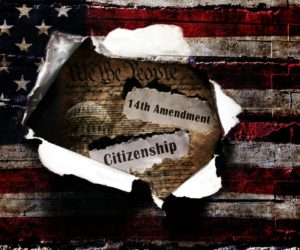One of my favorite books on my favorite classic TV comedian Jackie Gleason had a bittersweet ending. It portrayed a Gleason who was seemingly unhappy in many ways in his final years, surprisingly angry and moody after having achieved a show business celebrity status and brand name few had achieved.
In a way it was a tragedy…and our Quote of the Day comes via Dick Polman who looks at a New Yorker piece that chronicles the tragedy of John McCain — who also seems perpetually unhappy and angry. But first:
On the subject of McCain, I’m one of those who has been in grief now for years.
In 2000 McCain was exactly the kind of politician I always respected (and voted for): someone not lockstep with any party, who might have even been hated by some in his own party (I was a Lowell Weicker fan in Connecticut and a fan of New York Gov. and later Vice President Nelson Rockefeller). He was a politician who seemingly wouldn’t march lockstep with anyone — a seeming post-partisan before the phrase was popular. I read his best selling biography, watched him on TV every chance I could and proudlyi voted for him in the 2000 California Republican primary.
But this candidate didn’t sell within his own party and, later, among Congressional GOPers. So as he started to move towards seeking the 2004 Republican Presidential nomination he began to discard the “old McCain,” most particularly in some (but not all) ways during his ill-fated and poorly-executed presidential campaign.
Polman looks at the magazine piece and gives us some observations of his own. Here’s a cross section:
It has been quite a week for our most enigmatic celebrities. George Steinbrenner is dead, Roman Polanski is free, and John McCain is laid bare – this time, by New York magazine – as a grumpy old guy still marinating in his own anger. In the quoted words of one veteran McCain strategist, “He’s angry at Obama, at former staff, at his family life, at his fellow Americans. He’s angry.”
Yeah, I know, it’s hardly a shock to hear that the GOP’s’ ’08 White House aspirant is indeed what we already knew him to be. But this magazine piece is actually well worth reading, if you fancy taking a break from your beach novels. McCain will be in the news a lot on the eve of his Aug. 24 Senate Republican primary – remember, he’s trying to thwart a serious challenge on his right flank from conservative talk-show fulminator J. D. Hayworth – and the New York article is a truly timely look at a poignantly tragic character.
McCain, according to a multitude of sources, has been systematically deconstructing his so-called “maverick” image, and pandering shamelessly to Arizona right-wingers, because he is personally terrified by the prospect of defeat. As the author puts it, “McCain has been gripped by fear of political mortality,” and he will engineer as many policy flip flips as necessary in order to stay alive.
Polman looks at some of the background, notes that the article talks about how McCain is in mortal fear of retirement — and about how friends note there are “two” McCain’s and the more petty one is now in control of the persona.
Polman then concludes:
Actually, I’ve long thought that the McCain “maverick” image was a bit of a fraud; he was never quite the moderate independent that the Washington press corps deemed him to be. As late as 2005, he was ranked (by voteview.com) as the third most conservative senator in the chamber, and, as I wrote way back in February 2000, he had long demonstrated his fealty to Republican orthodoxy (among other things, by endorsing every item on Newt Gingrich’s ’94 Contract With America, voting for antiabortion bills more than 80 times, voting against raising the minimum wage, and earning a 14 percent rating from the ACLU). As Arizona political analyst Bruce Merrill told me in 2000, “For most of his career here, he was the darling of the far right.”
But he seemed mavericky because he cherry-picked a few marquee issues that got a lot of press – particularly campaign finance reform (a crusade he never talks about anymore). Actually, as the magazine piece points out, McCain didn’t exactly map this image strategy all by himself. Quite the contrary, in fact. He became a “maverick” because one of his closest aides thought it was a smart idea to present him as “dignified and honorable.”
Indeed, the strongest material in the article deals with the relationship between McCain and his aides. The so-called man of conviction turns out to be a tabula rosa, a blank slate of no fixed convictions – “impulsive, emotional, dependent to a fault on the advice of others.” Speechwriter and ghostwriter Mark Salter charted the maverick strategy back when he had the upper hand; today, Salter is basically out of the loop. The guy in charge today is a lobbyist-strategist named Rick Davis; he has long argued for McCain’s rightward lurch, and, as a key guy during the’08 campaign, Davis argued in favor of placing Sarah Palin one heartbeat away from the presidency – trumping Salter’s objections.
What’s noteworthy, however, is that even though McCain has lurched rightward in accordance with Davis’ advice in order to survive the Arizona GOP primary, he is no happy warrior. As one adviser tells the magazine, “He doesn’t like doing what he’s doing.” And therein lies the tragedy of McCain. Is it worth staving off political mortality, at such great cost to his own soul?
The case could still be made that in the political scheme of things McCain — when compared to others in Congress and how his personality, positions and willingness to reach across the aisle and work with some such as Ted Kennedy — was indeed about as much as a maverick as our lopsidded and rigged-for-partisanship political system will allow. And it could be argued that if someone had the will and political smarts they could make that kind of niche work.
To be sure, Barack Obama is having trouble reaching his goals as a politician who doesn’t exactly fall into one slot.
But the more you watch this angry John McCain who is shedding his old, respected legacy faster than a bearded dragon sheds it skin, it makes many of those not enamored with Barack Obama think about how much worse it would have been — the rancor, the anger, the polarization — if this lash-out McCain had been elected President.
The 2008 and 2010 McCain that is.
The 2000 McCain would have been refreshing and perhaps history making, if he governed how he had talked.
But that McCain vanished along with his brief moment in history years ago — and will likely never be seen again.
Joe Gandelman is a former fulltime journalist who freelanced in India, Spain, Bangladesh and Cypress writing for publications such as the Christian Science Monitor and Newsweek. He also did radio reports from Madrid for NPR’s All Things Considered. He has worked on two U.S. newspapers and quit the news biz in 1990 to go into entertainment. He also has written for The Week and several online publications, did a column for Cagle Cartoons Syndicate and has appeared on CNN.
















